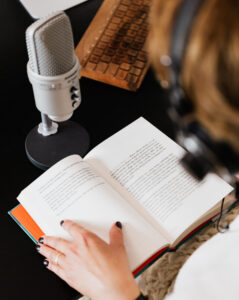Estimated reading time: 3 minutes
“We are, as a species, addicted to story.” [1]
The art of storytelling is at least 44,000 years old, dating back to the earliest cave drawings discovered in Indonesia. It is, of course, highly probable that oral storytelling dates back even further. And while some of the most famous inventions in history relate to how we communicate – from the printing press and the telegraph through to the mobile phone and the internet – the actual substance of what we communicate has remained remarkably consistent through the ages. Stories. In both the classic and not-so-classic sense.
What do we mean by a ‘story’?
There are countless definitions but my favourite is simply “a connected series of events told through words, imagery, body language…or any other form of communication”.
Given this interpretation, it’s evident that everything from a novel to a song to a ballet performance can present a story. Indeed, even viral short-form videos will often fit this structural definition – consider any of the stunts or ‘fail’ videos: they often show the scene beforehand, followed by the action, followed by the aftermath. The ‘connected series of events’ is engaging due to the ‘tension’ that is presented against the status quo. This is a key ingredient of a story – the need for a source of tension or conflict.

Why am I telling you this? Because stories are powerful. Whether you’re entertaining, educating, inspiring or influencing, the ability to weave your message into a narrative is key.
The science of storytelling
“The world’s priests and shamans knew what psychology would later confirm: if you want a message to burrow into a human mind, work it into a story.” [2]
Through science, we are now beginning to understand the biological reasons for our addiction to stories: they trigger the release of chemicals such as cortisol and dopamine. That’s cortisol, the stress hormone which makes us alert and helps with memory formation, and dopamine, the ‘feel-good’ chemical. An addictive combination.
A well-told story takes the audience on a journey. One which causes them to think, to feel, to reflect. This is true whether you’re pitching a new business idea or writing a novel. In all cases, it’s the ability to structure lots of information and detail into a flowing, engaging narrative.
Story + podcast = perfect combination
Podcasting is the perfect medium for storytelling: unlike radio, it is on-demand, unlike TV it is non-visual, unlike social media, it is devoid of newsfeed noise. In your own time, without distraction, you can sit and listen to a wide range of recitals of these ‘connected series of events’ – whether they be fictional or non-fictional.

This is why so many creators, brands and organisations are leaning into podcasts as a key part of their communications – they engage, they entertain, they help deliver messages in a memorable way. And, once again, the science backs this up – with higher recall rates and listen-through rates than other media.
We all have stories. Podcasts provide an intimate and accessible way to tell these to the world. They bring us back around the metaphorical campfire to listen to people recount stories that we can learn from, laugh at, and escape to. Orally depicted narratives told to an attentive and engaged audience.
[1] Jonathan Gottschall, The Storytelling Animal
[2] Jonathan Gottschall, The Storytelling Animal
Auddy – Campfire
With an increased focus on ROI, private podcasts provide the perfect solution for businesses to engage their communities in a measurable way.
Auddy Campfire is our private podcast distribution platform, creating the opportunity for you to share longer-form content with your communities, enabling a richer and more immersive experience. Interacting with your audience to build deeper connections and enhance your communication strategy.
This drives engagement, loyalty and provides meaningful analytics as to engagement and consumption (yes, you can measure what’s working!).
Plus, our creative teams can support you to deliver high quality and engaging content which meets your communication objectives.
Aligning workforces, updating investors, and reaching your target audiences has never been easier.
And private doesn’t need to mean secret… it can be special, confidential, or even exclusive content which only your community can hear.
Book a meeting with the team today to find out how Auddy Campfire can improve engagement and measurability for your business.
